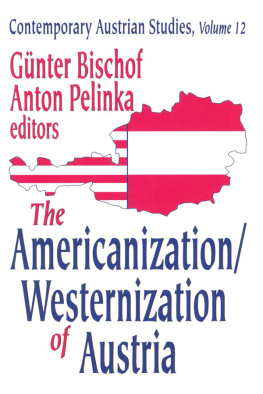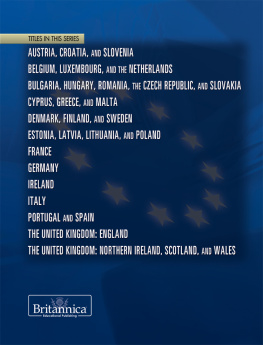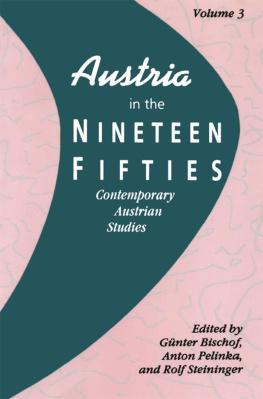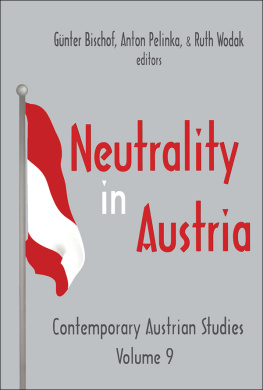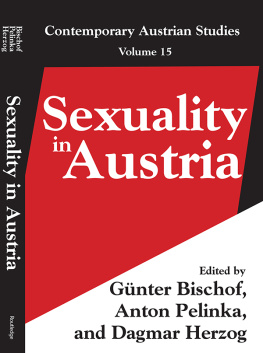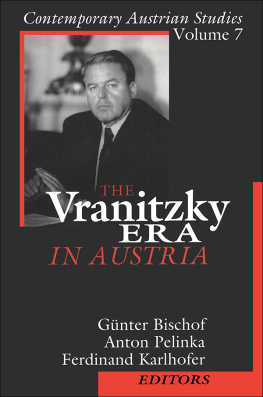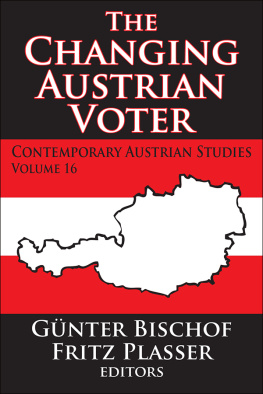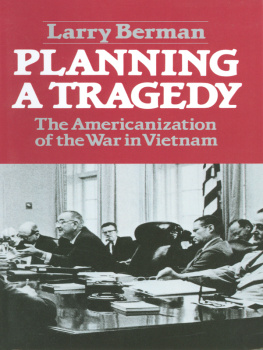The Americanization/Westernization of Austria
Contemporary Austrian Studies
Sponsored by the University or New Orleans and Universitt Innsbruck
Editors
Gnter Bischof, CenterAustria, University of New Orleans Anton Pelinka, University of Innsbruck
Production Editor
Ellen Palli
Copy Editor
Jennifer Shimek
Editoral Assistant
Martin David
Executive Editors
Franz Mathis, UNO Coordinator, University of Innsbruck Robert L. Dupont, Dean, Metropolitan College
Advisory Board
Ingrid Bauer
University of Salzburg
Siegfried Beer
University of Graz
Hans-Georg Betz
Geneva
Evan Bukey
University of Arkansas, Fayetteville
Mario Caciagli
University of Florence
Gary Cohen
Center for Austrian Studies University of Minnesota
Michael G. Huelshoff
University of New Orleans
Wilhelm Kohler
University of Linz
Jacques Le Rider
University of Paris VIII
Kurt Richard Luther
University of Keele
Andrei S. Markovits
University of Michigan, Ann Arbor
Richard Mitten
Trinity College
Margareta Mommsen
University of Munich
Hanspeter Neuhold
University of Vienna
Max Preglau
University of Innsbruck
Sonja Puntscher Riekmann
University of Salzburg
Peter Pulzer
Oxford University
Oliver Rathkolb
University of Vienna
Sieglinde Rosenberger
University of Vienna
Dieter Stiefel
University of Vienna
Franz Szabo
Center for Austrian Studies, University of Alberta
Ruth Wodak
University of Vienna
Publication of this volume has been made possible through a generous grant from the Austrian Ministry of Foreign Affairs through the Austrian Cultural Forum in New York and the Austrian Marshall Plan Anniversary Foundation in Vienna. The University of Innsbruck and Metropolitan College of the University of New Orleans have also provided financial support.
Contemporary Austrian Studies, Volume 12
Gnter Bischof Anton Pelinka editors
The Americanization/Westernization of Austria
First published 2004 by Transaction publishers
Published 2017 by Routledge
2 Park Square, Milton Park, Abingdon, Oxon OX14 4RN
711 Third Avenue, New York, NY 10017, USA
Routledge is an imprint of the Taylor & Francis Group, an informa business
Copyright 2004 by Taylor & Francis.
All rights reserved. No part of this book may be reprinted or reproduced or utilised in any form or by any electronic, mechanical, or other means, now known or hereafter invented, including photocopying and recording, or in any information storage or retrieval system, without permission in writing from the publishers.
Notice:
Product or corporate names may be trademarks or registered trademarks, and are used only for identification and explanation without intent to infringe.
Library of Congress Catalog Number: 2003066161
Library of Congress Cataloging-in-Publication Data
The Americanization/westernization of Austria /Gnter Bischof and Anton
Pelinka, editors.
p. cm.(Contemporary Austrian studies; v. 12)
Includes bibliographical references.
ISBN: 0-7658-0803-X
1. AustriaCivilization20th century. 2. AustriaCivilization
American influences. 3. Popular cultureAustriaAmerican influences.
4. AustriaPolitics and government1945- I. Bischof, Gnter, 1953- II.
Pelinka, Anton, 1941- III. Series.
DB91.2.A54 2003
303.48'2436073dc22
2003066161
ISBN 13: 978-0-7658-0803-5 (pbk)
Dedicated to Reinhold Wagnleitner and Berndt Ostendorf
Table of Contents
Gnter Bischof,
Reinhold Wagnleitner,
Arinin Thurnher,
Helmut Lackner,
Andr Pfoertner,
Matthias Fuchs and Klaus Weiermair,
Anton Fink,
Kurt Drexel,
Monika Bernold,
Anna Schober,
Christina Hainzl,
Maria-Regina Kecht,
Ingrid Bauer,
Reinhard Sieder,
Gnter Bischof and Martin Kofler,
Anton Pelinka,
Fritz Plasser,
Andrei S. Markovits:
Peter Berger:
Dieter Stiefel:
Martin David:
Samuel R. Williamson, Jr.:
Steven Beller:
Evan Burr Bukey:
Zoltan Tarr: Erwin A. Schmidl, Die Ungamkrise 1956 und sterreich: Mit einem Vorwort von Paul Lendvai
Csaba Bks, Malcolm Byrne, and Jnos M. Rainer, The 1956 Hungarian Revolution: A History in Documents
Reinhold Gartner,
Gnter Bischof
Throughout the course of history the blanket term Americanization has been used to bundle a variety of European reactions to the historical unfolding of the American liberal order.
[...] I reject the term "Americanization," a term that represses and hides more than it explains. This term attempts to define the development of the modern world with the unsuitable criteria of nationalistic stereotypes, which serves, for the most part, only one tasknamely, to conceal the fact that behind the phenomenon 'Americanization' lies the actual "Europeanization" of the world. The development of the modern world has much less to do with the propagation of the supposed national characteristics of those people who live in the United Sates than with the further development of the system of capitalism.
"Modernization""Americanization""Westernization""Globalization": all these terms signify broad processes of economic, social, and cultural transformations across the Atlantic and throughout the world in the course of the twentieth century. They resemble each other in the sense that they are diffuse and hard to pin down. They indicate differentoften overlappingkey phenomena of modern international co-existence, an economic and cultural confluence in a globalizing world moving ever more closely together through modern mass media and communication techniques.
The starting point to any debate on Americanization has to recognize the fact of the ascendancy of the United States to imperial status in the twentieth century. We no longer need to debate reluctantly whether we live in the world of the "American empire" but rather what kind of imperial presence the United States is emanating today. The American Empire is more powerful than the Roman one was in its heyday. Washington's projection of global military power is far more complete than Rome's. Ever since the United States began to exert its influence overseas in 1898,
Along with projecting its awesome military power and the ideology of exporting its democracy came the rejection of the "universality of reigning American values." Bacevich also questions "whether moral relativism, radical individualism, and conspicuous consumption constitute a formula guaranteeing the fulfillment of mankind's deepest aspirations."
Modernity/modernization accelerated as a result of a variety or historical forces during the last years of the Habsburg Monarchy. Fin-de-siecle Vienna became one of the hothouses to shape modern life in Western philosophy, psychoanalysis, and the arts (as evidenced by the preeminence of figures like Wittgenstein, Freud, and Schiele). Yet while the modem era was launched in European capitals, both technological and business innovation frequently radiated from the periphery in the United States. Since the beginning of the twentieth century, Taylorism (scientific management) and Fordism (conveyor belt driven mass production and mass consumption) increasingly influenced and shaped European business practices between the great wars, as the essays in the "Business" section of this volume amply demonstrate.


